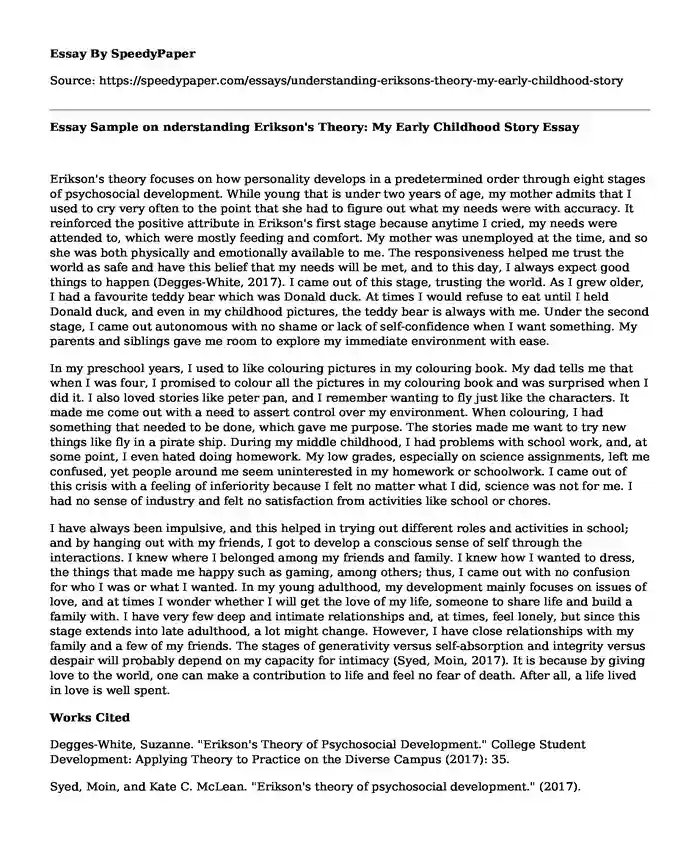
| Type of paper: | Essay |
| Categories: | Psychology Family Childhood |
| Pages: | 3 |
| Wordcount: | 624 words |
Erikson's theory focuses on how personality develops in a predetermined order through eight stages of psychosocial development. While young that is under two years of age, my mother admits that I used to cry very often to the point that she had to figure out what my needs were with accuracy. It reinforced the positive attribute in Erikson's first stage because anytime I cried, my needs were attended to, which were mostly feeding and comfort. My mother was unemployed at the time, and so she was both physically and emotionally available to me. The responsiveness helped me trust the world as safe and have this belief that my needs will be met, and to this day, I always expect good things to happen (Degges-White, 2017). I came out of this stage, trusting the world. As I grew older, I had a favourite teddy bear which was Donald duck. At times I would refuse to eat until I held Donald duck, and even in my childhood pictures, the teddy bear is always with me. Under the second stage, I came out autonomous with no shame or lack of self-confidence when I want something. My parents and siblings gave me room to explore my immediate environment with ease.
In my preschool years, I used to like colouring pictures in my colouring book. My dad tells me that when I was four, I promised to colour all the pictures in my colouring book and was surprised when I did it. I also loved stories like peter pan, and I remember wanting to fly just like the characters. It made me come out with a need to assert control over my environment. When colouring, I had something that needed to be done, which gave me purpose. The stories made me want to try new things like fly in a pirate ship. During my middle childhood, I had problems with school work, and, at some point, I even hated doing homework. My low grades, especially on science assignments, left me confused, yet people around me seem uninterested in my homework or schoolwork. I came out of this crisis with a feeling of inferiority because I felt no matter what I did, science was not for me. I had no sense of industry and felt no satisfaction from activities like school or chores.
I have always been impulsive, and this helped in trying out different roles and activities in school; and by hanging out with my friends, I got to develop a conscious sense of self through the interactions. I knew where I belonged among my friends and family. I knew how I wanted to dress, the things that made me happy such as gaming, among others; thus, I came out with no confusion for who I was or what I wanted. In my young adulthood, my development mainly focuses on issues of love, and at times I wonder whether I will get the love of my life, someone to share life and build a family with. I have very few deep and intimate relationships and, at times, feel lonely, but since this stage extends into late adulthood, a lot might change. However, I have close relationships with my family and a few of my friends. The stages of generativity versus self-absorption and integrity versus despair will probably depend on my capacity for intimacy (Syed, Moin, 2017). It is because by giving love to the world, one can make a contribution to life and feel no fear of death. After all, a life lived in love is well spent.
Works Cited
Degges-White, Suzanne. "Erikson's Theory of Psychosocial Development." College Student Development: Applying Theory to Practice on the Diverse Campus (2017): 35.
Syed, Moin, and Kate C. McLean. "Erikson's theory of psychosocial development." (2017).
Cite this page
Essay Sample on nderstanding Erikson's Theory: My Early Childhood Story. (2023, Nov 30). Retrieved from https://speedypaper.net/essays/understanding-eriksons-theory-my-early-childhood-story
Request Removal
If you are the original author of this essay and no longer wish to have it published on the SpeedyPaper website, please click below to request its removal:
- Psychology Essay Sample: The Counseling Goals and the Intervention Strategies
- Free Essay about Human Growth and Development
- Free Essay on Babies Born To Drug-Addicted Mothers
- Essay Sample on Organic Solidarity and Gesellschaft Social Structure
- Essay Example: Gratitude and Contentment With Life
- Exploring the Dual Impact of Social Media on Relationships. Essay Sample
- Paper Sample on Women and Gender Stereotype Effects
Popular categories




